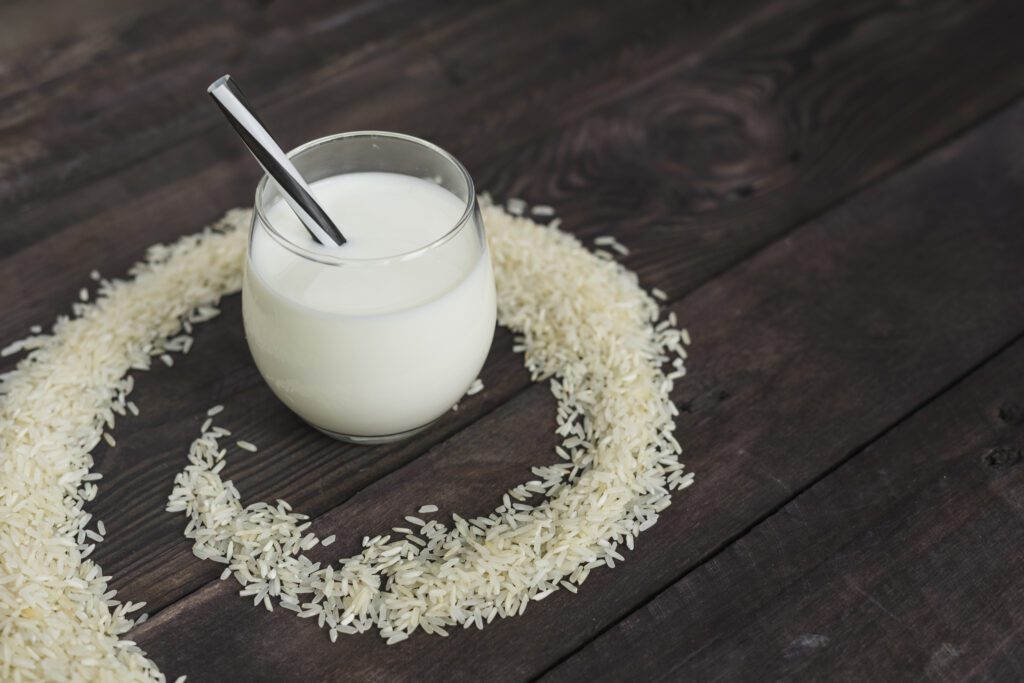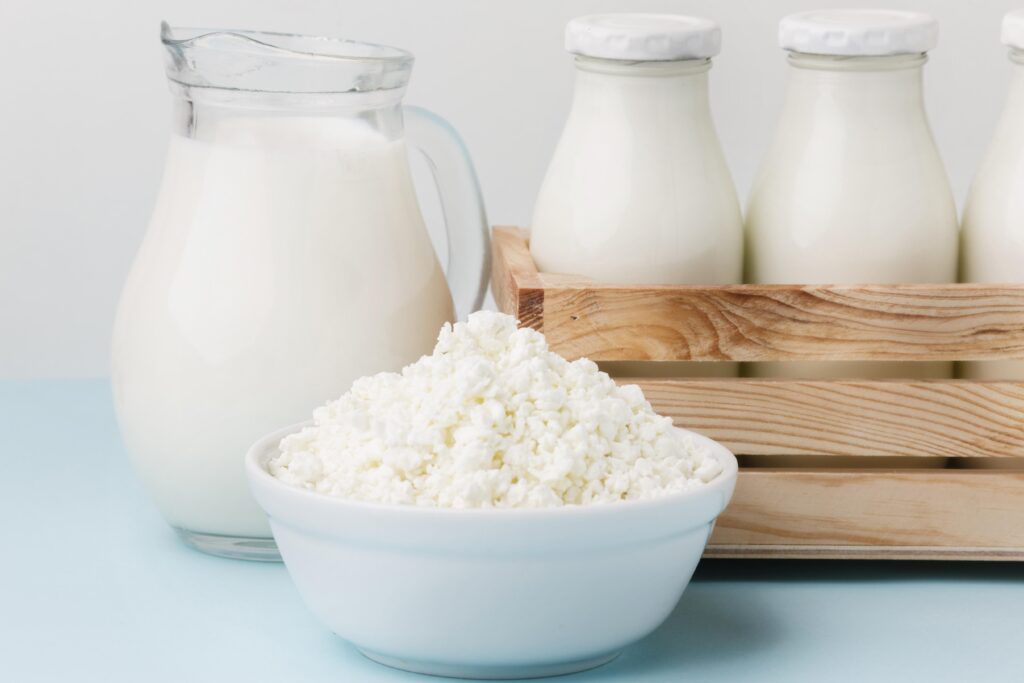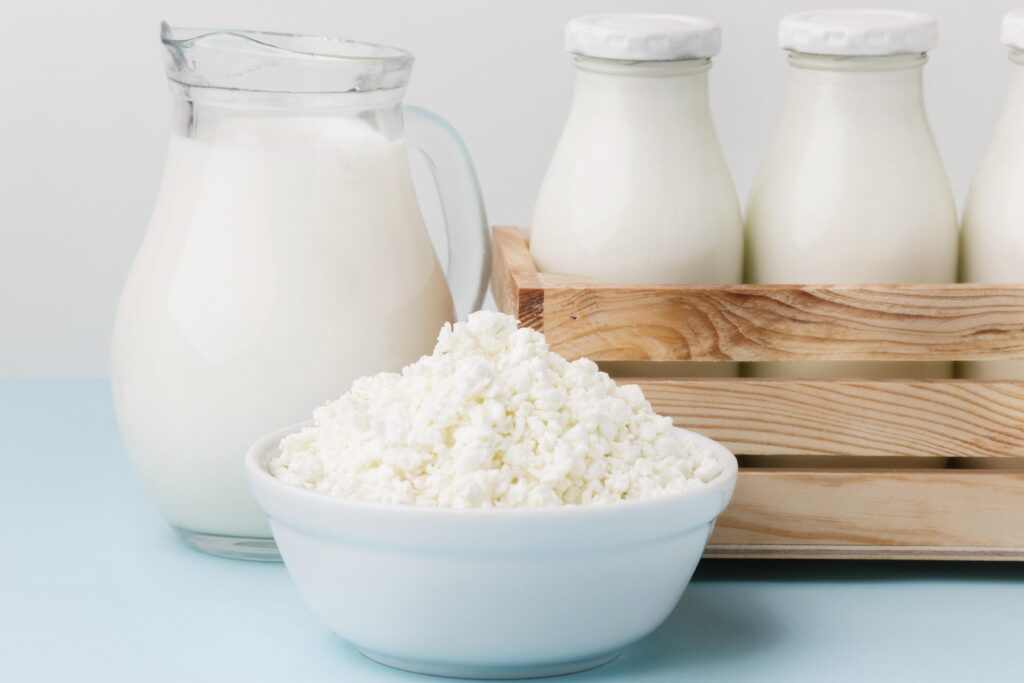1. Introduction to Rice Water For Weight Loss
Rice water, a simple yet potent concoction derived from soaking or boiling rice, has garnered attention not only for its culinary uses but also for its potential health benefits, including weight loss. Understanding its composition, properties, and historical significance lays the groundwork for exploring its efficacy in aiding weight management.

What is Rice Water?
Rice water is the starchy liquid leftover from soaking or boiling rice. It can be as simple as the cloudy water collected after rinsing raw rice or the strained liquid obtained from boiling rice in water. This humble liquid has been a staple in many cultures, appreciated for its mild flavor and versatility.
Overview of its Potential for Weight Loss
While rice water has been traditionally valued for its nutritional content and digestive benefits, recent interest has emerged regarding its role in weight loss. The premise is straightforward: a low-calorie, nutrient-rich beverage like rice water may complement weight loss efforts by promoting satiety, providing essential nutrients, and potentially influencing metabolic processes.
Key Points to Highlight:
- Low-Calorie Option: Rice water is typically low in calories, making it a favorable choice for those seeking weight loss without sacrificing essential nutrients.
- Nutrient Density: Despite its simplicity, rice water contains essential nutrients such as carbohydrates, vitamins, and minerals, offering a nourishing option for individuals on calorie-restricted diets.
- Potential Mechanisms: While the direct mechanisms of rice water’s impact on weight loss require further investigation, its ability to promote satiety and support digestive health may indirectly contribute to weight management.
Cultural and Historical Significance:
Throughout history, rice water has held significance beyond its nutritional value. In various cultures, it has been used not only as a beverage but also as a remedy for digestive ailments and a skincare tonic. This rich cultural heritage adds depth to the exploration of rice water’s potential benefits for weight loss.
Introducing rice water as a potential aid for weight loss sets the stage for a comprehensive examination of its nutritional composition, physiological effects, and practical applications. By delving into its historical context and scientific underpinnings, we can better appreciate its role in promoting overall well-being and supporting healthy weight management strategies.
2. How to Prepare Rice Water
Rice water can be prepared through various methods, each offering its own set of advantages and potential benefits. Understanding the different techniques allows individuals to tailor their approach based on convenience, desired flavor, and intended use.

Boiling Method:
- Ingredients:
- Raw rice (any variety)
- Water
- Steps:
- Measure the desired amount of rice and rinse it thoroughly to remove excess starch.
- In a pot, combine the rinsed rice with a sufficient amount of water. The ratio of rice to water can vary depending on preference, but typically, a 1:4 ratio works well.
- Bring the mixture to a boil over medium heat, stirring occasionally to prevent sticking.
- Once boiling, reduce the heat to low and let the rice simmer for 20-30 minutes, or until it becomes soft and the water turns cloudy.
- Remove the pot from heat and allow the rice water to cool.
- Once cooled, strain the liquid to separate the rice water from the cooked rice. The resulting liquid is your boiled rice water, ready for consumption or further use.
Quick Preparation Method:
- Ingredients:
- Raw rice (any variety)
- Water
- Steps:
- Measure the desired amount of rice and rinse it thoroughly.
- In a bowl or container, combine the rinsed rice with cold water. Use enough water to cover the rice completely.
- Let the rice soak for 30 minutes to 2 hours, depending on preference and desired potency.
- After soaking, gently agitate the rice to release more starch into the water.
- Strain the rice water using a fine mesh sieve or cheesecloth, separating the liquid from the rice solids.
- The resulting liquid is your quick rice water, which can be consumed immediately or stored in the refrigerator for later use.
Fermentation Process:
- Ingredients:
- Raw rice (any variety)
- Water
- Steps:
- Follow the same initial steps as the quick preparation method to soak the rice in water.
- Instead of immediately straining the rice water, transfer the soaked rice and water into a clean, airtight container.
- Allow the mixture to ferment at room temperature for 24 to 48 hours. During this time, naturally occurring bacteria and yeast will ferment the rice water, enhancing its flavor and potentially increasing its nutrient profile.
- Once fermented to your desired taste, strain the mixture to separate the liquid from the rice solids.
- The resulting fermented rice water can be used immediately or stored in the refrigerator for an extended period.
Key Considerations:
- Rice Variety: Different types of rice may yield slightly different flavors and nutrient profiles in the resulting rice water. Experimentation with various rice varieties can help discover preferences.
- Storage: Rice water can be stored in the refrigerator for several days, but it’s best to consume it fresh for optimal taste and nutritional benefits.
- Customization: To enhance the flavor or nutritional content of rice water, consider adding spices, herbs, or citrus zest during the boiling or fermentation process.
By mastering these preparation methods, individuals can harness the potential of rice water as a versatile beverage and culinary ingredient while exploring its efficacy in supporting weight loss goals.
3. Nutritional Composition and Properties of Rice Water
Understanding the nutritional composition and properties of rice water is essential for appreciating its potential benefits for weight loss. While seemingly simple, rice water contains a range of nutrients and bioactive compounds that may contribute to its efficacy as a dietary supplement.

Chemical Analysis and Nutritional Value:
1.Carbohydrates:
Rice water is primarily composed of carbohydrates, predominantly in the form of starch. This carbohydrate content provides a source of energy while contributing to the beverage’s viscosity and texture.
2.Vitamins:
Depending on the rice variety and preparation method, rice water may contain small amounts of vitamins, including B vitamins such as thiamine, riboflavin, and niacin. These vitamins play crucial roles in energy metabolism and overall health.
3.Minerals:
Rice water also contains minerals such as potassium, magnesium, and phosphorus. These minerals are essential for various physiological functions, including muscle function, nerve transmission, and bone health.
4.Bioactive Compounds:
Beyond its macronutrient and micronutrient content, rice water may contain bioactive compounds with potential health-promoting properties. These compounds include antioxidants, phenolic compounds, and amino acids, which contribute to the beverage’s overall nutritional profile.
Properties Relevant to Weight Loss:
1.Low Caloric Density:
One of the key properties of rice water that makes it conducive to weight loss is its low caloric density. Compared to sugary beverages or high-fat foods, rice water offers a relatively low-calorie option for hydration and satiety, making it suitable for individuals seeking to manage their caloric intake.
2.Satiety and Digestive Health:
The carbohydrate content of rice water, primarily in the form of starch, can contribute to feelings of fullness and satiety. Additionally, the fiber present in rice water, albeit in small amounts, may support digestive health by promoting regularity and enhancing gut microbiota balance.
3.Hydration:
Adequate hydration is essential for overall health and well-being, including weight management. As a hydrating beverage, rice water can help maintain fluid balance in the body, potentially reducing the risk of overeating due to thirst cues being mistaken for hunger.
Key Points to Highlight:
- Balanced Macronutrient Profile: While rice water is predominantly carbohydrate-based, its composition also includes small amounts of protein and fat, contributing to a balanced nutritional profile.
- Glycemic Impact: Despite its carbohydrate content, rice water typically has a low glycemic index, meaning it has minimal impact on blood sugar levels. This characteristic makes it suitable for individuals with diabetes or those following a low-glycemic diet for weight management.
- Potential Synergistic Effects: The combination of carbohydrates, vitamins, minerals, and bioactive compounds in rice water may exert synergistic effects on metabolism, appetite regulation, and overall energy balance, supporting weight loss efforts when incorporated into a balanced diet and lifestyle.
Understanding the nutritional composition and physiological properties of rice water provides insight into its potential role as a dietary adjunct for weight loss. By leveraging its unique attributes, individuals can harness the benefits of this simple yet versatile beverage as part of a comprehensive approach to achieving and maintaining a healthy weight.
4. Using Rice Water for Weight Loss
Incorporating rice water into a weight loss regimen requires strategic planning and an understanding of how this simple beverage can complement dietary and lifestyle changes. By exploring its potential mechanisms of action and practical applications, individuals can maximize the benefits of rice water for achieving their weight loss goals.

Mechanisms of Action:
1.Satiety Promotion:
The carbohydrate content of rice water, particularly in the form of starch, can contribute to feelings of fullness and satiety. Consuming rice water before or with meals may help reduce overall calorie intake by promoting portion control and reducing the likelihood of overeating.
2.Hydration Support:
Proper hydration is essential for optimal metabolic function and appetite regulation. Incorporating rice water as a hydrating beverage can help maintain fluid balance in the body, potentially reducing cravings and promoting better food choices.
3.Nutrient Density:
Despite its low caloric density, rice water contains essential nutrients such as carbohydrates, vitamins, and minerals. By consuming rice water as part of a balanced diet, individuals can ensure adequate nutrient intake while managing calorie intake for weight loss.
Practical Applications:
1.Pre-Meal Consumption:
Drinking a glass of rice water before meals can help curb appetite and reduce the likelihood of overeating. This strategy may be particularly beneficial for individuals prone to snacking or consuming large portions during meals.
2.Meal Replacement:
In some cases, replacing calorie-dense beverages or snacks with rice water can help reduce overall calorie intake without sacrificing essential nutrients. However, it’s essential to ensure that the diet remains balanced and varied to meet nutritional needs.
3.Post-Workout Hydration:
After exercise, replenishing fluids is crucial for recovery and hydration. Opting for rice water as a post-workout beverage can provide hydration while offering a source of carbohydrates to replenish glycogen stores without excessive calorie consumption.
4.Recipe Incorporation:
Beyond drinking rice water on its own, incorporating it into recipes such as soups, smoothies, or porridge can add volume and texture to meals without significantly increasing calorie intake. This allows for creative and satisfying meal options while supporting weight loss efforts.
Key Considerations:
1.Individual Preferences:
The effectiveness of rice water for weight loss may vary depending on individual preferences, dietary habits, and metabolic factors. Experimentation with different consumption patterns and timing can help determine what works best for each individual.
2.Consistency and Moderation:
While rice water can be a valuable tool for weight loss, consistency and moderation are key. It’s essential to incorporate rice water into a balanced diet and lifestyle that includes regular physical activity and other healthy behaviors.
3.Monitoring Progress:
Tracking food intake, hydration levels, and weight changes can help individuals assess the impact of incorporating rice water into their weight loss regimen. Adjustments can be made based on progress and feedback from the body.
By strategically incorporating rice water into a comprehensive weight loss plan, individuals can leverage its unique properties to support their goals while enjoying a simple and nourishing beverage. With careful planning and mindfulness, rice water can become a valuable ally in the journey towards achieving and maintaining a healthy weight.
5. Benefits of Rice Water for Weight Loss
Exploring the specific benefits of rice water for weight loss sheds light on its potential role as a dietary adjunct in achieving and maintaining a healthy weight. By understanding how rice water may contribute to weight management, individuals can make informed decisions about its inclusion in their diet and lifestyle.
1. Low Caloric Density:
a. Benefit:
Rice water offers a low-calorie beverage option that can help individuals manage their overall calorie intake, a fundamental aspect of weight loss.
b. Explanation:
With its minimal calorie content, rice water provides hydration and satiety without significantly contributing to daily energy consumption. This allows individuals to feel satisfied while reducing the risk of consuming excess calories, supporting weight loss efforts.
a. Satiety Promotion:
1. Benefit:
Consuming rice water may promote feelings of fullness and reduce appetite, leading to decreased food intake and improved portion control.
b. Explanation:
The carbohydrate content of rice water, particularly the presence of starch, can help delay gastric emptying and increase satiety hormones’ release. This can result in a greater sense of satisfaction after meals, reducing the urge to snack or overeat throughout the day.
3. Nutrient Support:
a. Benefit:
Despite its low caloric density, rice water contains essential nutrients such as carbohydrates, vitamins, and minerals, supporting overall health and well-being during weight loss.
b. Explanation:
By incorporating rice water into a balanced diet, individuals can ensure adequate intake of essential nutrients while managing calorie consumption. This promotes overall nutritional adequacy and prevents micronutrient deficiencies that may occur during calorie restriction.
4. Hydration Enhancement:
a. Benefit:
Proper hydration is crucial for optimal metabolic function and appetite regulation, both of which are essential components of successful weight loss.
b. Explanation:
As a hydrating beverage, rice water helps maintain fluid balance in the body, supporting metabolic processes and facilitating efficient nutrient transport. Adequate hydration also reduces the risk of dehydration-related hunger cues, preventing unnecessary calorie intake.
5. Versatility in Preparation:
a. Benefit:
Rice water can be prepared using various methods and incorporated into a wide range of recipes, providing flexibility and convenience for individuals seeking to include it in their weight loss regimen.
b. Explanation:
Whether boiled, fermented, or consumed as a quick soak, rice water offers versatility in preparation that accommodates different tastes and preferences. It can be enjoyed on its own or used as an ingredient in soups, smoothies, or other culinary creations, enhancing meal variety and satisfaction.
By harnessing the benefits of rice water for weight loss, individuals can optimize their dietary choices and lifestyle habits to support their health and wellness goals. With its low caloric density, satiety-promoting properties, nutrient support, hydration enhancement, and versatility in preparation, rice water offers a simple yet effective
6. Risks and Precautions
While rice water offers potential benefits for weight loss, it’s essential to consider potential risks and exercise caution when incorporating it into a dietary regimen. Understanding the potential contraindications and dangers associated with rice water consumption helps individuals make informed decisions about its inclusion in their weight loss journey.
1. High Arsenic Levels:
a. Risk:
Rice, the primary ingredient used to make rice water, has been found to contain arsenic, a naturally occurring toxic element. Prolonged consumption of rice or rice products, including rice water, may lead to arsenic accumulation in the body, posing health risks.
b. Precaution:
To mitigate the risk of arsenic exposure, individuals can opt for rice varieties with lower arsenic levels, such as basmati rice or jasmine rice. Additionally, rinsing rice thoroughly before cooking and using a larger cooking water-to-rice ratio can help reduce arsenic content in rice water.
2. Contamination and Spoilage:
a. Risk:
Rice water, especially when fermented, is susceptible to microbial contamination and spoilage, which can lead to foodborne illnesses if consumed.
b. Precaution:
Proper hygiene practices should be observed when preparing and storing rice water to minimize the risk of contamination. Use clean utensils, containers, and filtered water to prevent microbial growth. Refrigerate fermented rice water promptly and consume it within a reasonable time frame to avoid spoilage.
3. Allergic Reactions:
a. Risk:
Some individuals may be allergic or intolerant to rice or rice-derived products, leading to adverse reactions such as gastrointestinal discomfort, skin rashes, or respiratory symptoms.
b. Precaution:
Individuals with known rice allergies or sensitivities should exercise caution when consuming rice water and consider alternative beverages or dietary strategies. It’s essential to read food labels carefully and consult with a healthcare professional if uncertain about potential allergens.
4. Impact on Blood Sugar Levels:
a. Risk:
While rice water typically has a low glycemic index, meaning it has minimal impact on blood sugar levels, individuals with diabetes or insulin resistance should monitor their blood glucose response to rice water consumption.
b. Precaution:
Individuals with diabetes should incorporate rice water into their meal plan mindfully and monitor their blood sugar levels closely to assess its impact. It may be advisable to consume rice water in moderation and alongside other nutrient-rich foods to minimize potential spikes in blood glucose.
5. Interactions with Medications:
a. Risk:
Rice water, particularly when consumed in large quantities or in combination with certain medications, may interfere with medication absorption or metabolism, potentially altering therapeutic efficacy or causing adverse effects.
b. Precaution:
Individuals taking medications should consult with a healthcare professional or pharmacist to determine if there are any potential interactions between rice water and their medications. Adjustments to medication timing or dosage may be necessary to avoid adverse effects.
7. Applications Beyond Weight Loss
Beyond its potential role as a weight loss aid, rice water boasts a variety of applications in skincare, hair care, and culinary endeavors. Exploring these additional uses illuminates the versatility and holistic benefits of rice water, making it a valuable addition to various aspects of health and wellness.
1. Skincare Benefits:
- Use in Face and Body Cosmetics: Rice water has been treasured for centuries for its skin-nourishing properties. It contains vitamins, minerals, and antioxidants that can help improve skin texture, tone, and hydration. Incorporating rice water into facial toners, masks, or bath soaks can promote smoother, more radiant skin and may help alleviate certain skin conditions such as acne or eczema.
2. Hair Care Benefits:
- Benefits for Hair: Rice water is celebrated for its hair-strengthening and conditioning properties. It contains amino acids that can fortify the hair shaft, reduce breakage, and enhance hair elasticity and shine. Using rice water as a hair rinse or conditioner can help improve hair health, promote growth, and reduce scalp irritation and dandruff.
3. Culinary Applications:
- Cooking and Fermentation: Rice water is not only a byproduct of cooking rice but also a valuable ingredient in culinary endeavors. In some cultures, fermented rice water, known as “rice wine” or “rice vinegar,” is used in cooking to impart unique flavors and tenderize meats. Additionally, rice water can be used as a cooking liquid for grains, soups, or stews, adding subtle sweetness and depth to dishes.
4. Historical and Cultural Significance:
- Traditional Practices: Throughout history, rice water has held cultural and ritualistic significance in many societies. From ancient China to modern-day Japan, rice water has been used in traditional beauty rituals, religious ceremonies, and culinary traditions, reflecting its esteemed status as a symbol of purity, fertility, and prosperity.
5. Sustainable and Economical Option:
- Resourcefulness: Utilizing rice water in various applications promotes sustainability and reduces food waste by maximizing the use of every part of the rice plant. Instead of discarding rice water as a byproduct, individuals can repurpose it for skincare, hair care, or culinary purposes, making the most of its nutritional and functional properties.
8. Traditional Approaches to the Rice Water Diet
The rice water diet, rooted in ancient traditions and cultural practices, represents a time-honored approach to health and wellness that transcends mere weight loss. Exploring the traditional methods and philosophies behind the rice water diet provides insight into its historical significance and enduring relevance in contemporary dietary practices.
1. The Role of Rice Water in Traditional Diets:
a. Historical Context:
Rice, revered as a staple food in many cultures, holds a central place in traditional diets worldwide. Rice water, a natural byproduct of rice preparation, has been valued for its nutritional properties and therapeutic benefits for centuries.
b. Cultural Significance:
In regions where rice cultivation is prevalent, such as Asia and parts of Africa, rice water has been integrated into daily dietary routines and cultural rituals. It symbolizes nourishment, sustenance, and communal harmony, reflecting the cultural values associated with food and nutrition.
2. Traditional Recipes and Preparation Methods:
a. Simple Preparation:
Traditional methods of preparing rice water often involve minimal ingredients and straightforward techniques. In its simplest form, rice water is obtained by rinsing raw rice and soaking it in water, resulting in a lightly flavored liquid that can be consumed as a beverage or used in cooking.
b. Fermentation Practices:
In some cultures, fermented rice water, known as “amazake” or “tapuy,” is valued for its probiotic properties and enhanced flavor profile. Fermentation involves allowing cooked rice water to ferment naturally, yielding a slightly sweet, tangy beverage that is enjoyed for its taste and purported health benefits.
3. Cultural Practices and Beliefs:
a. Health and Healing:
Rice water is often regarded as a symbol of vitality and well-being in traditional medicine systems such as Ayurveda and Traditional Chinese Medicine (TCM). It is believed to have cooling properties that soothe digestive ailments, promote detoxification, and restore balance to the body.
b. Spiritual Significance:
In addition to its physical benefits, rice water holds spiritual significance in many cultures, where it is used in religious rituals, ceremonies, and offerings. Its association with fertility, abundance, and purity underscores its sacred role in cultural practices and spiritual beliefs.
4. Modern Interpretations and Adaptations:
a. Contemporary Applications:
While the traditional rice water diet remains rooted in ancient practices, modern interpretations have emerged to meet the evolving needs and preferences of today’s individuals. From trendy “rice water cleanses” to innovative culinary creations featuring rice water-infused dishes, contemporary approaches to the rice water diet reflect a blend of tradition and innovation.
b. Integration with Global Cuisine:
As interest in international cuisine grows, rice water has found its way into diverse culinary traditions, inspiring chefs and home cooks to experiment with new flavors and techniques. Whether used as a cooking liquid, a base for soups and stews, or a natural thickener in desserts and beverages, rice water continues to captivate gastronomic enthusiasts worldwide.
The traditional approach to the rice water diet offers a rich tapestry of history, culture, and culinary heritage that transcends mere dietary restrictions. Rooted in ancient wisdom and steeped in cultural significance, the rice water diet embodies the timeless principles of nourishment, balance, and harmony that resonate across generations and continents. By embracing its traditional roots and adapting them to modern lifestyles, individuals can honor the legacy of the rice water diet while exploring new possibilities for health, wellness, and culinary creativity.
9. Scientific Evaluation of the Rice Water Diet
While the rice water diet has deep roots in traditional practices, modern scientific inquiry offers valuable insights into its potential health benefits and physiological effects. By examining empirical evidence and research findings, we can gain a deeper understanding of the scientific basis underlying the rice water diet’s efficacy and explore its implications for contemporary dietary practices.
1. Nutritional Analysis and Composition:
a. Macronutrient Profile:
Scientific analysis of rice water reveals its composition, including carbohydrates, proteins, fats, vitamins, minerals, and bioactive compounds. Understanding the nutritional composition provides insight into the potential health-promoting properties of rice water.
b. Micronutrient Content:
Studies have examined the micronutrient content of rice water, identifying vitamins such as B vitamins (thiamine, riboflavin, niacin) and minerals such as potassium, magnesium, and phosphorus. These micronutrients play essential roles in metabolism, energy production, and overall health.
2. Physiological Effects and Mechanisms:
a. Satiety and Appetite Regulation:
Research suggests that rice water consumption may influence satiety and appetite regulation through various mechanisms, including gastric distension, hormonal signaling (e.g., ghrelin and leptin), and gut microbiota modulation. These effects may contribute to reduced calorie intake and improved weight management.
b. Digestive Health:
Studies have explored the impact of rice water on digestive health, highlighting its potential to promote gastrointestinal motility, alleviate constipation, and modulate gut microbiota composition. These effects may support overall digestive function and contribute to enhanced nutrient absorption and waste elimination.
3. Metabolic Effects and Weight Management:
a. Energy Balance:
The low caloric density of rice water, coupled with its nutrient content and satiety-promoting properties, may contribute to a negative energy balance, facilitating weight loss when incorporated into a calorie-controlled diet.
b. Glycemic Control:
Research suggests that rice water consumption may have beneficial effects on blood sugar regulation, potentially reducing postprandial glycemic response and improving insulin sensitivity. These effects may be particularly relevant for individuals with diabetes or metabolic syndrome.
4. Clinical Studies and Human Trials:
a. Weight Loss Interventions:
Some clinical studies have investigated the effects of rice water consumption on weight loss in human subjects. While preliminary findings are promising, further research is needed to elucidate the long-term effects and optimal strategies for incorporating rice water into weight loss interventions.
b. Health Outcomes:
Beyond weight loss, research has explored the broader health outcomes associated with rice water consumption, including improvements in lipid profiles, blood pressure, and inflammatory markers. These findings underscore the potential multifaceted benefits of rice water for overall health and wellness.
5. Future Directions and Research Opportunities:
a. Mechanistic Studies:
Further mechanistic studies are warranted to elucidate the underlying physiological mechanisms through which rice water exerts its effects on weight management and metabolic health. This may involve exploring its interactions with gut hormones, neurotransmitters, and metabolic pathways.
b. Clinical Trials:
Well-designed clinical trials are needed to evaluate the long-term efficacy and safety of the rice water diet in diverse populations, including individuals with obesity, diabetes, and other metabolic conditions. These trials can provide valuable insights into optimal dosages, timing, and adherence strategies for rice water consumption.
10. conclusion:
the rice water diet embodies a harmonious blend of traditional wisdom and modern scientific inquiry, offering a holistic approach to health and wellness that transcends mere weight loss. With its rich nutritional composition, physiological effects, and cultural significance, rice water holds promise as a valuable dietary adjunct for promoting satiety, supporting digestive health, and enhancing metabolic function.
While rooted in ancient traditions, the rice water diet continues to evolve and adapt to contemporary dietary practices, guided by empirical research and clinical evidence. Moving forward, further exploration of its mechanistic underpinnings and clinical applications will illuminate its full potential as a sustainable, accessible, and effective strategy for achieving and maintaining optimal health and well-being.
By embracing the legacy of the rice water diet and integrating it into modern lifestyles, individuals can harness its transformative power to nourish the body, nurture the spirit, and cultivate a deeper connection to the timeless rhythms of nature and culture.
FAQs:
1.How to make rice water at home?
To make rice water at home, simply rinse ½ cup of rice with water to remove impurities. Then, place the rinsed rice in a bowl and cover it with 2-3 cups of water. Let it soak for 30 minutes, stirring occasionally. Afterward, strain the rice, and the resulting milky liquid is your rice water.
2. How to make boiled rice for weight loss?
For boiled rice that aids in weight loss, opt for brown rice over white rice due to its higher fiber content. Cook it by adding one part rice to two parts water and simmering it until the water is absorbed. Brown rice’s fiber content helps you feel fuller for longer, supporting your weight loss efforts.
3.What is the rice and water diet?
The rice and water diet involves primarily consuming rice and water, often with minimal or no additional ingredients. This diet is typically low in calories and may promote weight loss in the short term, but it lacks essential nutrients and may not be sustainable for long-term health.
4.How much rice water should I drink a day?
It’s generally recommended to start with small amounts of rice water, such as half a cup per day, and gradually increase as tolerated. However, individual tolerance may vary, so it’s best to listen to your body and adjust accordingly.
5.How do Koreans make rice water?
Koreans traditionally make rice water by soaking rice in water and then straining out the liquid. This rice water can be used for various purposes, including skincare routines and hair treatments, due to its potential benefits for skin and hair health.
6.Does rice water whiten skin?
Rice water is believed by some to have skin-brightening properties due to its high content of vitamins and minerals. While there is anecdotal evidence supporting this claim, scientific research on its skin-whitening effects is limited. It may improve skin tone and texture with regular use.
7.Does rice burn belly fat?
While rice can be part of a balanced diet that supports weight loss, it alone does not directly burn belly fat. A calorie-controlled diet and regular exercise are key factors in reducing belly fat.
8.How to reduce abdominal fat?
To reduce abdominal fat, focus on a combination of a healthy, balanced diet, regular exercise (including cardio and strength training), stress management, and adequate sleep. Targeted abdominal exercises can also help tone the muscles in this area.
9.Does rice burn body fat?
Rice can be part of a healthy diet conducive to fat loss when consumed in moderation as part of a balanced meal plan. However, rice alone does not have the ability to directly burn body fat.
10.Is it OK to use rice water every day?
Using rice water every day is generally safe for most people, especially when used topically for skincare or hair care. However, if consumed orally, it’s advisable to monitor for any digestive discomfort and adjust the intake accordingly.
11.Can I drink boiled rice water?
Yes, boiled rice water can be consumed. It’s often rich in nutrients leached from the rice during cooking and can be a soothing beverage, especially when seasoned lightly with salt or flavored with herbs.
12.Can I drink boiled rice water daily?
Drinking boiled rice water daily is acceptable for most individuals, provided it’s consumed in moderation and as part of a balanced diet. However, be mindful of any digestive issues or discomfort that may arise and adjust your intake accordingly.



Pingback: Can Acupuncture Help With Weight Loss- Top 5 Secrets